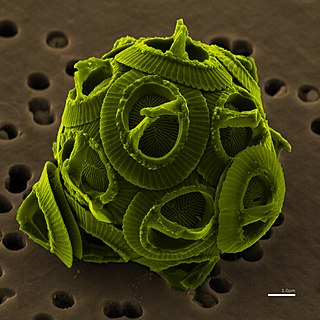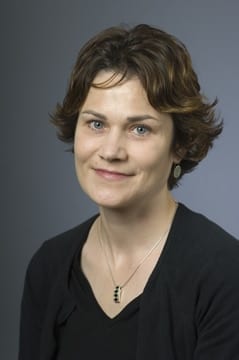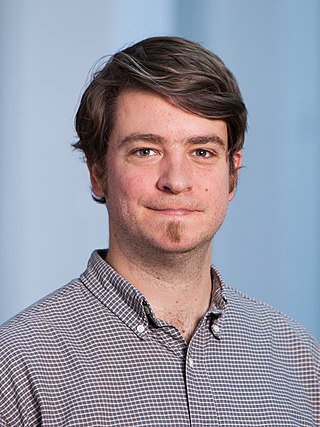Related Research Articles

Geomicrobiology is the scientific field at the intersection of geology and microbiology and is a major subfield of geobiology. It concerns the role of microbes on geological and geochemical processes and effects of minerals and metals to microbial growth, activity and survival. Such interactions occur in the geosphere, the atmosphere and the hydrosphere. Geomicrobiology studies microorganisms that are driving the Earth's biogeochemical cycles, mediating mineral precipitation and dissolution, and sorbing and concentrating metals. The applications include for example bioremediation, mining, climate change mitigation and public drinking water supplies.

The American Society for Microbiology (ASM), originally the Society of American Bacteriologists, is a professional organization for scientists who study viruses, bacteria, fungi, algae, and protozoa as well as other aspects of microbiology. It was founded in 1899. The Society publishes a variety of scientific journals, textbooks, and other educational materials related to microbiology and infectious diseases. ASM organizes annual meetings, as well as workshops and professional development opportunities for its members.

Geobiology is a field of scientific research that explores the interactions between the physical Earth and the biosphere. It is a relatively young field, and its borders are fluid. There is considerable overlap with the fields of ecology, evolutionary biology, microbiology, paleontology, and particularly soil science and biogeochemistry. Geobiology applies the principles and methods of biology, geology, and soil science to the study of the ancient history of the co-evolution of life and Earth as well as the role of life in the modern world. Geobiologic studies tend to be focused on microorganisms, and on the role that life plays in altering the chemical and physical environment of the pedosphere, which exists at the intersection of the lithosphere, atmosphere, hydrosphere and/or cryosphere. It differs from biogeochemistry in that the focus is on processes and organisms over space and time rather than on global chemical cycles.
The Center for Microbial Oceanography (C-MORE) is a research and education organization established in 2006 as a National Science Foundation funded Science and Technology Center.

Jillian Fiona Banfield is professor at the University of California, Berkeley with appointments in the Earth Science, Ecosystem Science and Materials Science and Engineering departments. She is the director of microbiology the Innovative Genomics Institute, is affiliated with Lawrence Berkeley National Laboratory and has a position at the University of Melbourne, Australia. Some of her most noted work includes publications on the structure and functioning of microbial communities and the nature, properties and reactivity of nanomaterials.

Antje Boetius is a German marine biologist. She is a professor of geomicrobiology at the Max Planck Institute for Marine Microbiology, University of Bremen. Boetius received the Gottfried Wilhelm Leibniz Prize in March 2009 for her study of sea bed microorganisms that affect the global climate. She is also the director of Germany's polar research hub, the Alfred Wegener Institute.
Roger Everett Summons is the Schlumberger Professor of Geobiology at the Massachusetts Institute of Technology and Professor of Geobiology in the Department of Earth, Atmospheric and Planetary Sciences.

Katrina Jane Edwards was a pioneering geomicrobiologist known for her studies of organisms living below the ocean floor, specifically exploring the interactions between the microbes and their geological surroundings, and how global processes were influenced by these interactions. She spearheaded the Center for Dark Energy Biosphere Investigation (C-DEBI) project at the University of Southern California, which is ongoing. Edwards also helped organize the deep biosphere research community by heading the Fe-Oxidizing Microbial Observatory Project on Loihi Seamount, and serving on several program steering committees involving ocean drilling. Edwards taught at the Woods Hole Oceanographic Institution (WHOI) and later became a professor at the University of Southern California.[1][2]
Hadesarchaea, formerly called the South-African Gold Mine Miscellaneous Euryarchaeal Group, are a class of thermophile microorganisms that have been found in deep mines, hot springs, marine sediments, and other subterranean environments.
Fumio Inagaki is a geomicrobiologist whose research focuses on the deep subseafloor biosphere. He is the deputy director of the Research and Development Center for Ocean Drilling Science and the Kochi Institute for Core Sample Research, both at the Japan Agency for Marine-Earth Science and Technology (JAMSTEC).

Mark Alexander Lever is a microbial ecologist and biogeochemist who studies the role of microorganisms in the global carbon cycle. He is a professor of biogeochemistry and geobiology at the Marine Science Institute of the University of Texas at Austin.
Shuhei Ono is a professor of earth, atmospheric, and planetary sciences at the Massachusetts Institute of Technology. In his research, he measures isotopes of sulfur and other elements to investigate water-rock-microbe interactions, seafloor hydrothermal systems, the deep biosphere, and global sulfur cycles.
Ann Pearson is the PVK Professor of Arts and Sciences and Murray and Martha Ross Professor of Environmental Sciences at Harvard University and former chair of the Department of Earth and Planetary Sciences. Her research in the area of organic geochemistry is focused on applications of analytical chemistry, isotope geochemistry, and microbiology to biogeochemistry and Earth history.

Tracy Teal is an American bioinformatician and the executive director of Data Carpentry. She is known for her work in open science and biomedical data science education.

Dawn Yvonne Sumner is an American geologist, planetary scientist, and astrobiologist. She is a professor at the University of California, Davis. Sumner's research includes evaluating microbial communities in Antarctic lakes, exploration of Mars via the Curiosity rover, and characterization of microbial communities in the lab and from ancient geologic samples. She is an investigator on the NASA Mars Science Laboratory (MSL) and was Chair of the UC Davis Department of Earth & Planetary Sciences from 2014 to 2016. She is Fellow of the Geological Society of America.
Tanja Bosak is a Croatian-American experimental geobiologist who is currently an associate professor in the Earth, Atmosphere, and Planetary Science department at the Massachusetts Institute of Technology. Her awards include the Subaru Outstanding Woman in Science Award from the Geological Society of America (2007), the James B. Macelwane Medal from the American Geophysical Union (2011), and was elected an AGU fellow (2011). Bosak is recognized for her work understanding stromatolite genesis, in addition to her work in broader geobiology and geochemistry.
Rachel Dutton is an American microbiologist. She has developed the microorganisms that live on cheese into a model system for complex interacting microbial communities. She has worked with chefs including Dan Felder, head of research and development at Momofuku to develop new fermentation procedures to be used in food and has been called the "go-to microbiologist" for chefs and gastronomists.
David Michael Karl is an American microbial biologist and oceanographer. He is the Victor and Peggy Brandstrom Pavel Professor of Microbial Oceanography at the University of Hawaiʻi at Mānoa and the Director of the University Center for Microbial Oceanography: Research and Education.
Jennifer B. Glass is a biogeochemist, geomicrobiologist, astrobiologist, and associate professor of biogeochemistry in the School of Earth and Atmospheric Sciences at the Georgia Institute of Technology in Atlanta, Georgia. Glass received the 2021 Thomas Hilker Award for Excellence in Biogeosciences from the American Geophysical Union. She was awarded the 2021 Alice C. Evans Award for Advancement of Women from the American Society of Microbiology.
Elizabeth Trembath-Reichert is a geomicrobiologist and astrobiologist at Arizona State University's School of Earth and Space Exploration.
References
- ↑ "MacArthur winner Victoria Orphan showed how deep-sea microbes keep greenhouse gas out of the atmosphere". Los Angeles Times. 2016-09-21. ISSN 0458-3035 . Retrieved 2017-03-08.
- ↑ "Orphan Lab". orphanlab.caltech.edu. Retrieved 2017-03-08.
- ↑ "Caltech Environmental Science and Engineering". www.ese.caltech.edu. Retrieved 2017-03-08.
- ↑ "Schmidt Ocean Institute". Schmidt Ocean Institute. Retrieved 2020-01-30.
- ↑ "Victoria J. Orphan | www.gps.caltech.edu". www.gps.caltech.edu. Retrieved 2016-12-08.
- ↑ "MBARI Adjunct Victoria Orphan receives "genius grant"" . Retrieved 2016-12-08.
- ↑ "People". www.darkenergybiosphere.org. Retrieved 2016-12-08.
- ↑ "Victoria J. Orphan | Division of Geological and Planetary Sciences". www.gps.caltech.edu. Retrieved 2020-03-07.
- ↑ "Center for Environmental Microbial Interactions". microbiology.caltech.edu. Retrieved 2020-03-07.
- ↑ "Victoria Orphan Named LGBTQ+ Scientist of the Year". California Institute of Technology. 2023-09-06. Retrieved 2023-10-10.
- ↑ "People". Kerckhoff Marine Laboratory. Retrieved 2023-10-10.
- ↑ "Schmidt Ocean Institute". Schmidt Ocean Institute. Retrieved 2020-01-30.
- ↑ "| NASA Astrobiology Institute". nai.nasa.gov. Retrieved 2017-03-08.
- ↑ "Superorganisms are changing our understanding of life — NOVA Next | PBS". NOVA Next. 2016-04-20. Retrieved 2017-03-08.
- ↑ "Simons Foundation | Advancing Research in Basic Science and Mathematics". Simons Foundation. Retrieved 2020-01-30.
- ↑ "The Most Unknown (2018) – IMDb". www.imdb.com. Retrieved 2021-06-09.
- ↑ "MacArthur winner Victoria Orphan showed how deep-sea microbes keep greenhouse gas out of the atmosphere". Los Angeles Times. 2016-09-22. Retrieved 2020-11-13.
- ↑ "Shana Goffredi". www.oxy.edu. Retrieved 2023-10-10.
- ↑ "Grant Detail". www.moore.org. Retrieved 2017-03-08.
- ↑ "DOE Early Career Awards". DOE. 2016-05-04. Retrieved 2017-03-08.
- ↑ "Grant Detail". www.moore.org. Retrieved 2017-03-08.
- ↑ "Celebration of Excellence". Center for Inclusion & Diversity. Retrieved 2023-10-10.
- ↑ "Victoria Orphan — MacArthur Foundation". www.macfound.org. Retrieved 2016-12-08.
- ↑ Stoeter, Author Sarah. "Victoria Orphan, NOMIS Distinguished Scientist Awardee 2018". The NOMIS Foundation. Retrieved 2019-03-26.
{{cite web}}:|first=has generic name (help) - ↑ Hatch, Avery S.; Liew, Haebin; Hourdez, Stéphane; Rouse, Greg W. (2020-12-05). "Hungry scale worms: Phylogenetics of Peinaleopolynoe (Polynoidae, Annelida), with four new species". ZooKeys (932): 27–74. Bibcode:2020ZooK..932...27H. doi: 10.3897/zookeys.932.48532 . ISSN 1313-2970. PMC 7237507 . PMID 32476973.
- ↑ "New 2020 Members Announced". American Academy of Arts & Sciences. 23 April 2020. Retrieved 2021-02-20.
- ↑ "2021 Class of AGU Fellows Announced". Eos. 28 September 2021. Retrieved 2021-09-29.